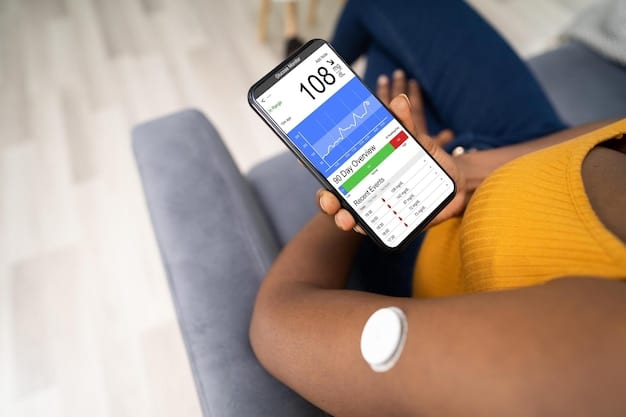AI-Powered Diabetes Management: Achieve 15% A1C Reduction in the US

AI is revolutionizing diabetes management in the US by personalizing treatment plans, analyzing patient data to predict glucose levels, and providing real-time feedback, leading to a potential 15% reduction in A1C levels.
How AI Can Personalize Diabetes Management: Achieving a 15% Reduction in A1C Levels for US Patients is becoming a reality, offering improved health outcomes and quality of life for individuals living with this chronic condition. Let’s explore the transformative potential of AI in revolutionizing diabetes care.
The Evolution of Diabetes Management with AI
Traditional diabetes management often involves a one-size-fits-all approach, requiring patients to navigate complex self-care routines with limited personalized guidance. However, the integration of artificial intelligence (AI) is heralding a new era of personalized diabetes care, particularly in achieving significant reductions in A1C levels for US patients.
AI algorithms can analyze vast amounts of patient data, including glucose levels, diet, activity patterns, and medication adherence, to provide tailored recommendations and insights. This level of personalization empowers patients to make informed decisions and proactively manage their condition, ultimately leading to better glycemic control and improved overall health.

Data-Driven Insights for Personalized Care
AI algorithms excel at identifying patterns and trends in patient data that may not be immediately apparent to human clinicians. By analyzing glucose levels, meal logs, activity data, and other relevant information, AI can provide personalized insights into how different factors impact a patient’s glycemic control.
- Predictive Analytics: AI can predict future glucose levels based on historical data and current trends, allowing patients to anticipate potential spikes or drops and take proactive measures to prevent complications.
- Personalized Recommendations: AI can offer tailored recommendations for diet, exercise, and medication adjustments based on individual needs and preferences.
- Real-Time Feedback: AI-powered systems can provide real-time feedback and guidance to patients through smartphone apps, wearable devices, or virtual assistants.
These data-driven insights empower patients to make informed decisions and proactively manage their condition, leading to better glycemic control and reduced risk of complications.
In summary, AI’s data analysis capabilities provide personalized care plans, enhancing both effectiveness and patient experience in diabetes management.
How AI Algorithms Personalize Treatment Plans
AI algorithms form the backbone of personalized diabetes management by analyzing patient data and tailoring treatment plans to individual needs. These algorithms consider a multitude of factors, from glucose readings to lifestyle choices, to create optimized strategies for achieving glycemic control.
The personalization aspect of AI in diabetes management ensures that patients receive the most effective interventions based on their unique circumstances, ultimately leading to better health outcomes.
Adaptive Learning for Optimal Outcomes
One of the key features of AI algorithms is their ability to learn and adapt over time. As patients continue to use AI-powered systems, the algorithms refine their recommendations based on new data and feedback, ensuring that treatment plans remain relevant and effective.
- Iterative Refinement: AI algorithms continuously refine their recommendations based on patient progress and feedback.
- Dynamic Adjustments: Treatment plans are dynamically adjusted to accommodate changes in lifestyle, medication, or other relevant factors.
- Improved Accuracy: As more data is collected, AI algorithms become more accurate and reliable in predicting glucose levels and recommending interventions.
This adaptive learning capability ensures that patients receive the most effective and personalized treatment plans possible, leading to improved health outcomes and quality of life.
In conclusion, the adaptive learning of AI algorithms enables treatment plans to be finely tuned, ensuring that patients receive interventions that are both relevant and increasingly effective over time.
The Role of Wearable Technology and AI in Continuous Monitoring
Wearable technology plays a critical role in continuous monitoring of glucose levels, activity patterns, and other relevant health metrics for individuals with diabetes. When combined with AI, these wearable devices can provide continuous, personalized feedback and guidance to patients in real-time.
This continuous monitoring and feedback loop empowers patients to make proactive decisions and maintain better glycemic control throughout the day.

Seamless Integration of Data for Proactive Care
AI algorithms can seamlessly integrate data from various sources, including continuous glucose monitors (CGMs), fitness trackers, and electronic health records, to provide a comprehensive view of a patient’s health status. This integration enables more accurate predictions and personalized recommendations.
- Real-Time Alerts: AI can generate real-time alerts when glucose levels are trending outside of the target range, allowing patients to take corrective action before serious complications occur.
- Automated Insulin Delivery: In some cases, AI can be used to automate insulin delivery through closed-loop systems, also known as artificial pancreases.
- Improved Adherence: AI-powered systems can provide reminders and encouragement to help patients stay on track with their medication and self-care routines.
This seamless integration of data empowers patients to take proactive steps to manage their condition and prevent complications, ultimately leading to better health outcomes.
Overall, the synergy between wearable tech and AI delivers continuous monitoring and real-time feedback, equipping patients with the tools they need for proactive self-care.
Achieving a 15% Reduction in A1C Levels: Real-World Examples
Several real-world examples demonstrate the potential of AI-powered diabetes management to achieve a 15% reduction in A1C levels for US patients. These examples showcase the effectiveness of personalized treatment plans, continuous monitoring, and real-time feedback in improving glycemic control.
These success stories provide a compelling case for the widespread adoption of AI in diabetes care to improve health outcomes for individuals living with this condition.
Case Studies of Successful AI Implementation
Numerous case studies have documented the positive impact of AI on diabetes management. These studies highlight the benefits of personalized treatment plans, continuous monitoring, and real-time feedback in achieving significant reductions in A1C levels.
Consider a clinical trial, focusing on how integrating an AI powered app lead to an A1c decrease of 1.3% versus the control group leading to increased medication compliance, healthier diet and more exercise.
- Improved Glycemic Control: Studies have shown that AI-powered systems can significantly improve glycemic control, as measured by reductions in A1C levels.
- Reduced Hypoglycemia: AI can help prevent hypoglycemia by predicting glucose levels and providing alerts when levels are trending too low.
- Increased Patient Engagement: AI-powered systems can increase patient engagement by providing personalized feedback and gamified challenges.
As more data is collected and analyzed, the benefits of AI in diabetes management will become even more apparent, paving the way for widespread adoption and improved health outcomes.
In summary, real-world successes highlight the clear benefits of AI in diabetes management, including significant A1C reductions and improved patient engagement.
Challenges and Considerations for AI in Diabetes Care
While AI holds immense promise for revolutionizing diabetes care, there are also several challenges and considerations that must be addressed to ensure its safe and effective implementation. These challenges include data privacy, algorithmic bias, and the need for human oversight.
Addressing these challenges is essential for realizing the full potential of AI in improving health outcomes for individuals living with diabetes.
Ensuring Ethical and Equitable AI Implementation
One of the key challenges in implementing AI in healthcare is ensuring that algorithms are fair, unbiased, and do not perpetuate existing health disparities. It is also important to protect patient data and ensure that AI systems are used ethically and responsibly.
- Data Privacy: Robust data privacy safeguards must be in place to protect patient information from unauthorized access or misuse.
- Algorithmic Bias: AI algorithms must be carefully designed and tested to ensure that they are not biased against certain demographic groups.
- Human Oversight: Human clinicians must have the ability to review and override AI recommendations when necessary.
Addressing these ethical and practical considerations will be critical for building trust in AI and ensuring that it is used to improve health outcomes for all individuals with diabetes.
Fundamentally, ethical and equitable implementation of AI in diabetes care requires vigilance, particularly in safeguarding patient data and mitigating algorithmic bias.
The Future of Personalized Diabetes Management
The future of personalized diabetes management is bright, with AI poised to play an increasingly important role in improving health outcomes and quality of life for individuals living with this chronic condition. As AI technology continues to evolve, we can expect to see even more sophisticated and personalized solutions emerge.
This continued innovation will transform the way diabetes is managed, empowering patients to take control of their health and live longer, healthier lives.
Advancements in AI and their Impact on Diabetes Care
Several promising advancements in AI are expected to have a significant impact on diabetes care in the coming years. These advancements include:
- Improved Predictive Accuracy: AI algorithms will become even more accurate in predicting glucose levels and identifying potential complications.
- More Personalized Treatment Plans: AI will be able to create even more personalized treatment plans based on individual needs and preferences.
- Seamless Integration with Other Technologies: AI will be seamlessly integrated with other technologies, such as telehealth platforms and remote monitoring devices.
These advancements will usher in a new era of precision medicine for diabetes, where treatment plans are tailored to the unique characteristics of each individual patient, leading to better health outcomes and improved quality of life.
Looking ahead, ongoing developments in AI promise to create even more personalized and effective diabetes care strategies, further enhancing patient outcomes.
| Key Point | Brief Description |
|---|---|
| 📊 AI Personalization | AI tailors diabetes management plans to individual needs. |
| ⌚ Continuous Monitoring | Wearables and AI enable real-time tracking and feedback. |
| 📉 A1C Reduction | AI-driven strategies aim to reduce A1C levels by 15%. |
| 🛡️ Ethical Concerns | Data privacy and algorithmic bias require careful attention. |
Frequently Asked Questions
▼
AI analyzes patient data, like glucose levels and activity, to tailor treatment plans. This leads to personalized insights and recommendations for better glycemic control and overall health.
▼
Wearable devices, such as CGMs, continuously monitor glucose levels. Combined with AI, they provide real-time feedback and alerts, helping patients proactively manage their condition.
▼
Yes, real-world examples and studies have shown that AI-powered diabetes management can lead to significant reductions in A1C levels through personalized treatments and monitoring.
▼
Ethical concerns include data privacy and algorithmic bias. Ensuring AI systems are fair, unbiased, and protect patient data is critical for responsible implementation.
▼
AI will offer more precise, personalized treatments and integrate seamlessly with other technologies. This will lead to improved health outcomes and a better quality of life for individuals with diabetes.
Conclusion
In conclusion, how AI can personalize diabetes management: achieving a 15% reduction in A1C levels for US patients is not just a possibility but an evolving reality. By leveraging data-driven insights, wearable technology, and continuous monitoring, AI is transforming diabetes care, offering hope for improved health outcomes and a better quality of life for millions affected by this chronic condition.





